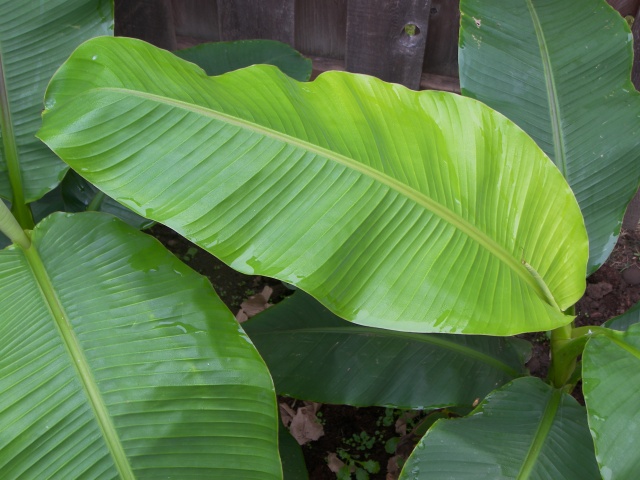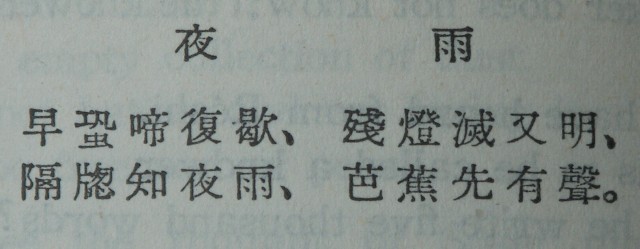Some two months ago, I moved to a less busy neighborhood and a place with a tiny bit of gardening space. One of the first things I did was to plant a couple of small hardy bananas, the kind known as Musa basjoo, which can survive the winters here. The “basjoo” part comes from the Japanese name for the plant, and that in turn was where the hokku writer Bashō got his name. He not only liked the beauty of the large, green leaves (as do I), but also felt a kinship with their fragility — the leaves are easily torn by the wind.

In many places on the Internet, one will find this verse (or a slight variation of it) attributed to Bashō:
Outside the window,
Evening rain is heard;
The banana leaf speaks of it first.
I am not sure where, precisely, this widespread but mistaken attribution to Bashō began.
Actually, however, the lines come from a brief Chinese poem by the Tang Dynasty writer Bai Juyi (白居易, also found as Po Chü-i), who lived from 772–846 c.e.
Here is my rather loose rendering:
EVENING RAIN
An early cricket chirps and is silent;
The lamp flame dims, then brightens.
Evening rain has begun outside my window —
Announced by the pattering on the banana leaves.
Literally, the last two lines in the original mean that the rain is “first announced” by the banana leaves — but that of course means the pattering sound of the drops on the wide leaves is heard.

Now how did it come to be thought a hokku? That we can tell. In the first volume (Eastern Culture) of R. H. Blyth’s “Haiku” series (remember that Blyth unfortunately used the then-current term introduced by Shiki), he gives his translation of Bai Juyi’s poem:
RAIN AT NIGHT
A cricket chirps and is silent:
The guttering lamp sinks and flares up again.
Outside the window, evening rain is heard;
It is the banana plant that speaks of it first.
Then (this is on page 62), Blyth makes two hokku out of it:
1.
A cricket chirps
And is silent;
The guttering lamp sinks.
2.
Evening rain;
The bashō
Speaks of it first.
Blyth quite accurately calls verse #2 “the essence of the original poem.”
It is a good poem, whether in the Chinese original or as hokku #2. But the hokku is not by Bashō. It is R. H. Blyth’s “essence” of the Chinese poem by Bai Juyi.
Blyth’s making of the hokku from the Chinese verse is a good example for students of how to reduce an experience. It is not that the hokku is better than the Chinese original; it is just that as hokku, it distills the experience to — as Blyth says — its essence. And that is what hokku gives us: the essence of any poetic experience. So the Chinese poem is better as a Chinese poem, and the hokku version is better as a hokku.
It is rather difficult to find the original poem in Chinese online, so here it is for those of you who like to see originals:

Now, with my own banana trees newly in the ground, I can add my own related hokku:
(Spring)
Pattering on the leaves
Of the just-planted banana —
The first raindrops.
David

There is so much noise in the world today that the essence of life is blocked out. Your posts help me to take heart and hope. Thank you David.
So beautiful. I can just imagine how clean that rain smells!